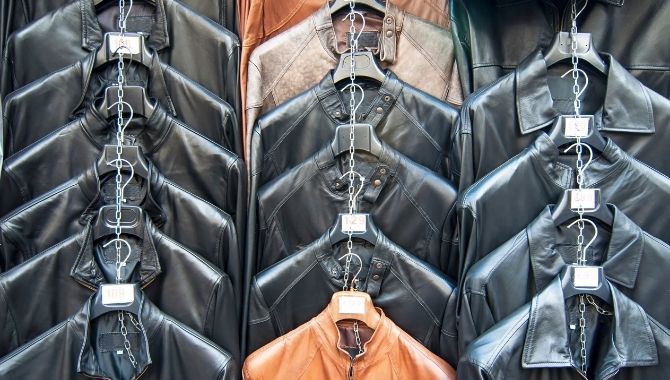The need to lead vegan lives has increased massively in recent years with more and more people opting for habits that don’t contribute to harming animals. But aside from the food industry, the clothing and footwear industry is another common user of animal-derived products. Leather is undoubtedly the chief candidate.
Leather is quite ubiquitous as it can be found in clothing, shoes, handbags, belts, gloves, upholstery, and so on. There are a lot of reasons people love to wear leather products but if you are vegan you may want to rethink your wardrobe content. This material is very controversial in the vegan world and raises a lot of questions that I’m going to address throughout this text.
Do vegans wear leather? A simple answer is no because leather is derived from animal skin. Veganism is against all forms of animal exploitation for human consumption, which leather contributes towards. There are, however, some vegans who argue that leather is a by-product of the meat industry; as such, consuming it does not cause harm in itself.
Making use of animal products and by-products is a dominant paradigm worldwide and as vegans, we cannot make assumptions about the products we consume. It’s both surprising and upsetting to learn how much or our products are literally built from the suffering of animals. Being a more active and vigilant consumer has never been more important if we want to support animal welfare in all our purchases.
But it’s not always easy, which is why I research about the vegan status of different products to help make your vegan journey easier. Our focus for today is going to be leather, so let’s get right into it.
Do Vegans Wear Leather
Vegans are generally against the use of any animal product or by-product and seeing as leather falls in this category, most will not wear it. But just as there are vegans who consume honey, although this is not the norm, there are some who believe wearing leather is okay.
The truth is there’s no clear cut rule for being vegan. I’m not here to shame anyone but rather learn from one another so we can keep the vegan journey going. Let me take you through both sides of the argument when it comes to the vegan status of leather so you can make an informed decision.
Arguments for Wearing Leather
Leather is a by-product of the meat industry?
Leather is often assumed to be incidental to the meat industry. In other words, cows are primarily killed for meat and rather than throwing out the skin, it may as well be used to make leather. Those in support of this notion say that they are honouring the animal by wearing leather; if not, it would have died for nothing.
This is a false assumption as it only beneficial the person who profited from exploiting the animal. Did you know that a cow’s skin is about 10% of its total value? This makes it the most profitable part of the cow’s body and significant motivation to breed and slaughter them. It’s more accurate to describe leather as a co-product in the meat industry since it cannot exist without an animal losing its life.
Leather is not only derived from cows but also from pigs, dogs, goats, kangaroos, snakes, crocodiles, whales, ostrich, and any other animal skin you can imagine. Therefore, aside from the co-product idea, some animals are killed primarily for their skin. Either way, buying leather only increases the demand for animal products, which in turn increases animal killing.
Market demand for second-hand leather
Some vegans argue that buying second-hand leather products doesn’t harm animals as it only makes use of the already existing products. While this may be true to some level, the contribution can be outright normalisation or influence. Second-hand leather is still an animal product and wearing it only sends the message that it is okay to kill animals for their skin. The more second-hand leather products are bought, the more leather will be seen as a valuable and convertible material.
Additionally, not everybody likes second-hand clothing, so you wearing cool vintage leather boots might influence or inspire someone else to purchase a new pair of leather boots.
Other Reasons Not To Wear Leather
Aside from ethical concerns, people turn vegan for environmental purposes. We’ve already determined that purchasing leather only fuels factory farming, which generally has a vast environmental footprint. Such intensive farming is responsible for significant greenhouse gas emissions –more than the transport industry –which contributes to climate change. It also contributes to deforestation as huge amounts of land are cleared for rearing the animals. Plus, it is responsible for soil pollution and makes use of high amounts of water resources.
Last, but not least, leather production makes use of a lot of chemicals that are toxic for the people working in tanneries or live close by.
What Should Vegans Do With Their Old Leather Products?
Adopting a vegan diet is quite simple; all you have to do is stop buying animal-based foods. The transition is not as easy when it comes to clothing. This is not a black and white issue and I believe there’s no right or wrong answer as it all depends on your circumstances. Let me explain:
The most ethical solution would be to throw away all your leather products so you or no one else can wear them. However, replacing your leather clothes, shoes, jackets, and belts all at once can be extremely expensive. Unless you can afford to, I see nothing wrong with continuing to wear your current leather outfits until they are worn out at which point you will replace them with vegan versions.
Secondly, throwing away all your leather products will only be adding to the landfill and since most leather is non-biodegradable due to the tanning process, it will contribute to environmental damage. You could, therefore, sell all your leather products or better yet, donate them to charity.
But even these options might seem problematic as they uphold the status quo that wearing animal materials is okay.
Being vegan looks different for each individual and I feel like as long as you are making a conscious decision to eliminate animal suffering, then you are on the right path. For those who have to continue wearing leather products out of necessity, get ready to be called out as hypocritical. Just keep in mind that choosing to be kinder to animals is not a purity competition but rather a lifestyle of never-ending series of animal-free choices.
Is There A Vegan Alternative?
With all the animal welfare and environmental concerns of traditional leather, vegans only have one option and that is to wear vegan leather –also known as faux leather/synthetic leather/Pleather/alternative leather. This is a leather-like material produced in a synthetic manner without the use of any animal-derived products or by-products.
Much like how traditional leather is made out of different kinds of animals’ skins, vegan leather is also made using a variety of non-animal materials. The most common one is vegan leather made from Polyvinyl Chloride, otherwise known as PVC or Vinyl. Unfortunately, since this leather alternative is made with fossil fuels, it presents the same environmental problems as other synthetic materials. It is non-biodegradable and releases potentially hazardous chemicals when burnt.
Another popular alternative to PVC for vegan leather is polyurethane, otherwise known as PU. But even this presents its own set of environmental and economic challenges.
The truth is leather, whether vegan or not, can be an incredibly harmful fabric at multiple levels of the supply chain. There are ecological concerns with all types of leather and their production process exposes workers and the people who live nearby to harmful chemicals.
With that being said, faux leather ultimately contains no animal products and doesn’t contribute to any form of animal cruelty.
Summary, Should Vegans Wear Leather?
Vegans should strive to stop wearing real leather –whether new or used. New leather financially supports the meat industry while used leather supports the notion that wearing animal materials is okay.
Alternative faux leathers are vegan friendly in the sense that they don’t make use of any animal product, so you can add them to your wardrobe. However, they do come at a significant environmental cost. Plus, the tanning process for leather (both real and vegan) has some major health concerns.
Don’t despair though as new technology means that vegan leather alternatives are being made in more sustainable ways. One of these is kombucha leather, which is made from SCOBY bacteria used in making the increasingly popular kombucha tea. The great thing about this vegan leather is that it can be composted after use. Just keep in mind that beeswax is oftentimes used in the drying process of the SCOBY, which makes some forms to be technically non-vegan.
Some fashion brands use thicker and more durable PVC, which is still non-biodegradable but designed to last just as long as real leather. The list of vegan leather fabrics also includes cork, wine, pineapple, mushroom, paper, hemp plant, waxed cotton, tree bark, fallen teak leaves, cool stone, and many more. In short, there are endless examples of innovative ways for replicating animal-leather in a sustainable and cruelty-free way.
Welcome to VeganClue - My name is Robert Van De Ville and together with my team we spent hundreds of hours researching the most relevant topics for Vegans and non yet Vegans. Are you looking for more information about Veganism, animal welfare, diet, health, and environmental benefits of the Vegan lifestyle? You are in the right place! Enjoy the site.

